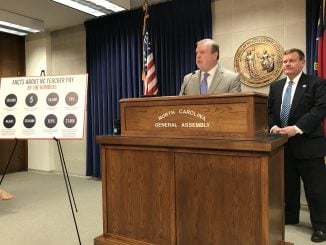
RALEIGH — The N.C. Association of Educators is celebrating the closure of nearly a dozen school districts for the day of the group’s “Rally for Respect.” The event is their platform to call for higher raises and more spending on education. The NCAE is using #itspersonal on social media to promote the event. So far, the state’s two largest districts, Wake and Charlotte-Mecklenburg, will close that day, along with nine others: Durham, Chapel Hill-Carrboro, Mooresville Graded Schools, Guilford, Asheville City, Orange, Iredell-Statesville, Cabarrus and Nash-Rocky Mount.
“These are local decisions made with the safety of students in mind, but I hope more school boards do not have to close schools that day,” said N.C. Department of Public Instruction Superintendent Mark Johnson. “We all know this affects students, parents and other school employees. Protesting is a right, but it can be just as effective during non-school hours.”
In N.C., the General Assembly had already planned the fifth consecutive pay raise for teachers, with this year’s hike bringing the average teacher salary to more than $52,000, plus $16,000 annually in benefits.
In 2018, the National Education Association listed N.C. as second for fastest-rising pay in the U.S., dropping from No. 1 in 2017. Sen. Harry Brown (R-Onslow), co-chair of the Senate Appropriation Committee, has been working on the budget ahead of the session. He reports that the planned pay raise for teachers is on track, along with millions more for school construction.
“I hope they will take a look at what we’ve done,” said Brown of the state’s public school teachers. “North Carolina leads the nation in bringing teacher pay to a competitive level. We’ve added a billion dollars to education spending over the last seven years.”
Calling it the Teacher Appreciation Agenda, the Republican-led General Assembly released data outlining the pay hikes for teachers based on experience.
According to the N.C. Department of Fiscal Research, the average teacher pay raise from 2017 to 2019 will be $4,412, and when compared to five years ago, the average teacher pay raise from 2014 to 2019 will be $8,600, a more than 19 percent increase. Over the past five years, the teachers with the most experience got the smallest raises, a 21 percent increase, while midcareer teachers got the largest at 48 percent.
The National Association of Educators ranked N.C. 37th in the nation for teacher pay, but an analysis from the CCCC accounted for cost of living and placed N.C. at No. 27 for teacher pay.
“We’ve tried to address the situation as best we can, and coming out of a recession that wasn’t easy,” said Brown.
“While teacher salaries in N.C. are on average a little above the $50,000 mark, there is still room for improvement,” said Rep. Ed Hanes (D-Forsyth). “We should aspire as a state to lead the south in salary for our teachers. Most importantly will be our commitment to equipping our teachers with supplies for their students. We are grossly negligent in this regard as a General Assembly. We must do better.”
The demonstration next week follows others around the nation: in Arizona where schools were closed for a week; West Virginia where schools closed for two weeks; and Kentucky and Oklahoma where thousands of kids were out of school. All those are Republican-controlled states where Democrats are working to motivate their voter base ahead of the November midterm elections. Teachers in Colorado, which has a Democratic governor, walked out last week.
In Wake County, the school board decided to cancel schools after 2,500 teachers asked for the day off.
“It was to show support of our teachers but also to be clear to our school community at large that while instructional time is important, the safety and well-being of our children is important,” said Wake County School Board Chairman Monika Johnson-Hostler in a press conference Monday.
Groups who oppose education funding increases through tax hikes say school districts need to cut back on nonteaching staff rather than seek bigger budgets. They point to data from education reform group EdChoice showing that nationwide, per-pupil funding adjusted for inflation rose 27 percent between 1992 and 2014 as schools added ranks of nonteaching support staff.
“When we peel back the political rhetoric on teacher pay, the facts indicate North Carolina educators received considerable gains in compensation for the incredible work they do in our schools,” House Speaker Tim Moore (R-Kings Mountain) said. “In the N.C. House, we prioritize every child’s education with the goal of results that improve student performance.”
The NCAE released the agenda for the demonstration day saying that the group will march from NCAE headquarters in downtown Raleigh to the legislative building, and then instructed participants to gather on the third floor above the chambers and file into the galleries during session.


